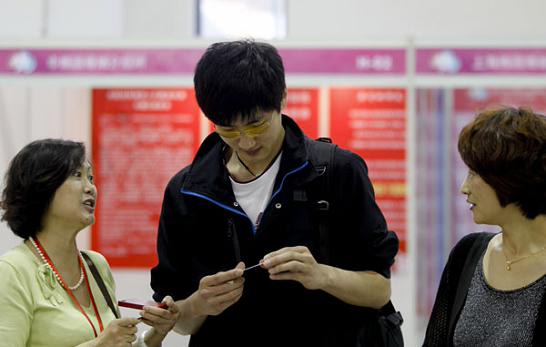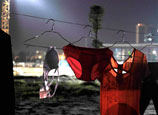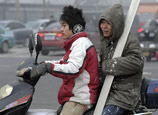
 |
| Agency employees urge a young man to register with their company at the weekend's matchmaking event. [Photo by Zhang Dong / for China Daily] |
Sun Peidong, a sociology professor with East China University of Political Science and Law, was confused that the format was so popular, despite its low success rate, before she chose the spot for a field study and spent almost a year interviewing more than 40 "desperate" parents aged between 48 and 73.
"In big cities such as Shanghai, choosing a mate is more than a personal choice for singles. Rather, it's a family choice, because parents and their adult children are bound by issues such as housing, social welfare and security and China's family planning policy," said Sun.
"For example, Chinese parents are insecure about the social safety net, including pensions and health care, as the country's current welfare and security system can't take good care of them, and so their only child needs to do the job instead," she said. "Therefore, picking a son- or daughter-in-law is like purchasing reliable life insurance for the future of their children and themselves. They want to upgrade their children's lives by finding the perfect better half."
Yin Peiyong, 65, a frequent visitor to People's Park, admitted that many other parents back off when they hear that his son only earns 5,000 yuan a month. "They think it's too little and inevitably focus more on material issues such as income and housing, rather than personality and temperament," he said.
As cool as going to bars'
Back at the matchmaking party, Xu Meng giggled when a man took the initiative to strike up a conversation. However, he turned away on learning that she's just 22.
"He said I'm too young for him. But to be honest, I didn't come to find a 'future husband', it's just fun to attend an event like this," said the Anhui province native, who works as a software test engineer in Shanghai.
"The media also seems to give the message that we need to hurry up and find 'Mr Right', otherwise, we'll become 'leftovers' in few years, and that stings," said Xu, who explained that she'd attended to see what was available "in the market".
Xu was not the only person from the post-1990 generation hunting for novelty at the venue. Her view was shared by 20-something Nicholas Torres from the United States.
"It's as cool as going to bars," he said, as he took a break from a series of eight-minute "speed dates" during which he spoken to six girls.
Torres, who studies in Shanghai, organized a trip to the event and invited three Japanese friends - also exchange students - plus some Chinese friends to act as "tour guides".
However, just as the post-1990 generation and expats have started to embrace the matchmaking concept, some slightly older, unmarried Chinese women are rejecting the idea and are happy just being single.
Qian Wentao, 30, a confident, personable woman who earns a good salary, has her own apartment and holds a master's degree from an overseas university, said being single at her age isn't half bad. "If I'm happy with my life right now, why bother to go on blind dates to find a so-called 'better half' who may lower my current standard of living?" asked the Shanghai hotel executive.
A believer in the theory that A-grade guys will find B-grade women, B-grade guys will find C-grade women and C-grade men will find D-grade women, Qian said all that's left are A-quality women and D-quality men.
"Therefore, I'm proud to be a 'leftover', but the term 'leftover' is disrespectful. To make it worse, the media aggressively disseminates this idea in all kinds of reports and surveys, putting pressure on us indirectly," she said.
Qian said she'd love to meet the right guy, but believes that will happen when it happens and there's no need to set a deadline to hurry things along.

















 University doors open for its security guards
University doors open for its security guards


![]()
